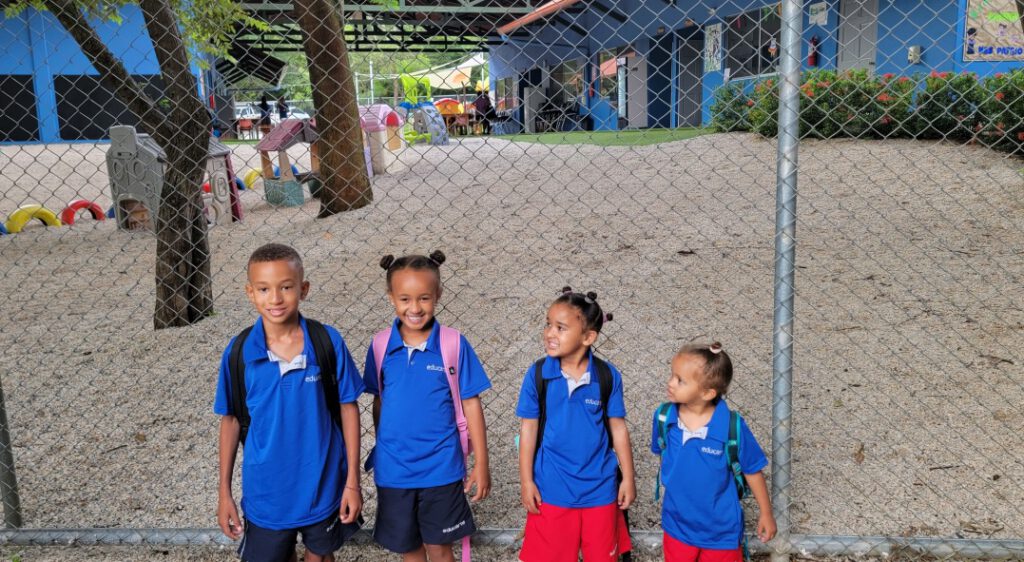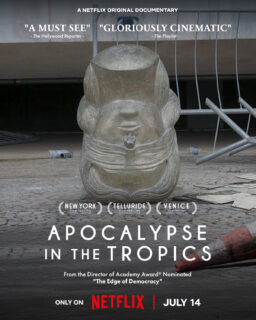We started our extended vacation from the US in the summer of 2021, primarily for the benefit of our four children, and to attempt to fully expose them to a different language and immerse them in a new culture. Academically, we narrowed our selection to two schools in the Pacific Coast of Costa Rica, in Guanacaste. Both schools offered Spanish immersion programs with a mixture of global ex-pat families and students from the local community. We completed the extensive applications for all four children at both schools. However, when it was time for the virtual tour, one school said, “Wait until to you get here to schedule the tour, but pay your deposit now.” The other school, which we chose, offered us a virtual tour and advised, “Once you get here, come visit us, and if it is a good fit, pay your deposit.”
So, at the start of the 2021-2022 school year, we had a student in first grade, another in kindergarten, and two in the pre-primary program. The tuition cost was about half of what we paid in the US. Conversely, private schools here and in San Jose (the capitol) rival the cost of private schools in the US. Our first grader had half of his subjects in Spanish and the other half in English, with two different primary teachers. In addition, Social Studies and history is about Costa Rica, with a primary focus on Central America. He was also enrolled in Spanish at second language study hall. Our kindergarten student had one primary teacher who navigated the day in Spanish and English. Our youngest two primarily received instruction in Spanish.
The youngest two have the best accents in the house. They pronounce words almost like native Spanish speakers. By April/May of 2022, our oldest was translating for us in the grocery store. Although our kindergartner did not grasp the language as quickly, socially, she made many friends. A beautiful smile quashes the language barrier. In 2023, at times, she now helps me with translations.
In addition to the academic experience, we placed the older two children in fútbol, jujitsu, surf, music, and parkour classes. We often ask the instructor or host of an event to speak to our children in Spanish. Further, when ordering food or requesting assistance, we ask them to speak in Spanish. It offers them autonomy and an additional chance to practice the language. One of the biggest challenges is that there are a lot of English-speaking ex-pats in our local footprint, but when we drive 45 minutes outside of the area, often times is solo español. When we have traveled to other parts of the country, our family has been forced to speak Spanish, which has inspired us to become more conversational. For me especially, it has grown a deeper empathy for interacting with people who are in a new country but don’t speak the majority language.

For children’s birthday parties, we were used to having to RSVP with the specific child we were bringing, and the time of the party was usually very rigged (11 am – 1 pm generally means you’re out the door at 1 pm). Here, our first party lasted almost six hours. I intentionally arrived 30 minutes late, thinking the party would end at 2 pm. The clown did not start until almost 3 pm, and the piñata was untouched until about 4:30 pm. At 5:45 pm, the party was still going strong, but I advised we were leaving. We left with full stomachs, bags of candy, smiles, and newly developed culture appreciation for being present for the celebration of life an amazing young child. During the academic year, we find ourselves at least three to four parties a month. One weekend we had two on the same day. The second party host was disappointed I did not bring all four children. The host insisted I take two extra gift bags for my two kids at another party.
We have truly developed a community here. In developing the community, we are working to bring the resources to support the academic community at our children’s school. A peer family group in the US had two children competing in domestic and international robotics competitions. We were elated for them, and it encouraged us to think about how we could incorporate more STEM programs into our local school and the community. We worked with other parents at our children’s school and the administration to apply to win an industrial 3D printer. Part of the submission required a video. In the video, we have children speaking languages from Hebrew, German, French, Italian, Spanish, and English, expressing how an industrial 3D printer would not only help our school but our local community as well. Our students want to enhance their school recycling program by making their own printer filament. With filament, they want to make desks and chairs for their peers in the local public schools, who have a shortage of those resources.

We realize our children will be a part of a global economy once they enter professional life, so we supplement what they learn in the classroom with virtual and in-person tutors and culture exposure. We are spending this summer in the US at STEM camps, and our oldest, who truly enjoys reading, wants to spend as much time as possible in the library. Fundamentally, the empathy and understanding they are learning here cannot be supplemented. At the end of the last school-year we almost shifted our oldest two children to new school environments that we perceived as having more academic rigor, but the love, language, and culture components was missing at that school (for us). That was our primary focus for coming here.
Our friends have their children at that school and other schools, which works great for them. We also have friends who homeschool and others who place their children in local public schools, where the academic calendar is different from the traditional US and European fall, spring, and summer schedule. Moreover, in public schools, usually, instruction is 100% in Spanish. Seemingly, each family thrives in the educational and social ecosystem they have created for their respective families. We have found that doing what’s best for your crew should be the goal in alignment with your priorities. Difficulties and challenges arise in each environment, but the resounding response I get from those in conflict is that I would rather be solving problems in this environment than elsewhere.
Our advice in selecting a school as an ex-pat would be to visit the school first. Make sure the academic philosophies and pedagogy discussed on their website and social media are congruent with what you see and hear in person. Ask others in your ex-pat group about their experiences at the school. Apply early. Great school environments fill up quickly. Early for us was almost ten months, relatively we have a large family. At some point, they may all be in different schools, but in grammar school, we wanted them to be in the same environment. Further, if the school does not have a wanted resource, ask if they are open to you working with them and other parents to get it. 3D printers are the first step for us to field a robotics team.
Picking your neighborhood is essentially important as well. When we first arrived, we were in a large, beautiful home with a private pool and ample yard space, but there were no kids we could see beyond the gate. Subsequently, we moved to a much smaller home with a shared community pool, but our kids can now go outside the front door and play with kids from different schools and countries. Our house is very humble for us.
But back to priorities, the top being language and cultural exposure for our kids. In that respect, we have won the lottery except for storage space. We drive the extra distance for social programs, so our kids can be involved in programs where the instructors primarily speak Spanish or another language that is not English. Luckily our kids can walk to the house of their music instructor, who is Brazilian.
As you plan your extended vacation, be clear about the experience you want for yourself and your family. Select schools, social activities, and your neighborhood based on your criteria, not someone you admire in an ex-pat travel group. Those groups are essential and have many benefits, but the joy you have from seeing your plan being executed is inexplicably positively overwhelming. Moreover, as you face challenges, you will have more joy in the trenches because you are fighting to make your family’s dream a reality.
André Hammel is the founder of Biadvo.com. He and his wife Traci, a nurse practitioner, are on an extended stay in Matapalo (Pacific Coast), Costa Rica.











